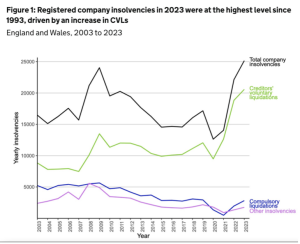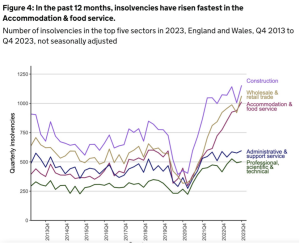Business Insolvency On the Rise – How to Avoid Becoming a Statistic
The UK’s economic landscape has recently been marked by a concerning rise in business insolvencies, including long established brands, signalling a widespread struggle as companies grapple with various external pressures. According to the latest government statistics, company insolvencies have climbed to their highest levels since 1993, underscored by a surge in Creditors’ Voluntary Liquidations (CVLs).
Registered Insolvencies England & Wales 2003-2023
Figure 1 from the recent government report paints a stark picture: a dramatic spike in total company insolvencies in 2023, with CVLs leading the charge. This trend is a clear indication that businesses are actively seeking ways to manage untenable financial situations, often resulting in the difficult decision to cease operations voluntarily.
Insolvencies by Sector
Figure 4 delves deeper into the sectors most affected, with the Accommodation & Food Service industry experiencing the fastest rise in insolvencies over the past year. This, alongside notable increases in the Construction and Wholesale & Retail Trade sectors, highlights the uneven impact of economic hardships across different industries.
These statistics serve as a barometer for the economic pressure that businesses face, much of which is completely outside of their control. Factors such as Brexit-induced uncertainties, global supply chain issues, and the aftereffects of the COVID-19 pandemic have converged to create a perfect storm of financial duress.
The data suggests a worrying trend that many insolvency practitioners expect to see continue throughout 2024. The figures emphasise the urgency of addressing these pressures at a macro level but also highlight the need for businesses to avoid the risk of relying on such interventions. It may not come in time.
Positive Proactive Action to Avoid Insolvency
In response to these challenges, business owners are exploring a variety of strategies to stay solvent. Restructuring debt, optimising operations, improving productivity, and pivoting to new, less saturated markets are some of the approaches being taken to mitigate the risk of the business failing. Unfortunately, as the statistics indicate, no matter how many initiatives you try, the problem comes down to one of reducing costs.
The cost reduction options open to employers, and the steps they can take, often directly results in a focus on reducing payroll expenditure. When faced with this challenge it can prove to be a highly charged, emotional situation making it a very difficult process to manage effectively.
In these circumstances, it can prove enormously beneficial to bring in an external resource to offer a fresh perspective along with considerable experience in tackling similar situations.
Specialist HR consultants and Employment Lawyers will provide crucial support, leveraging their knowledge and legal acumen to help the management team navigate through a turbulent period.
Despite the practicalities and logic of accessing external support, it remains one of the most underutilised strategies. The right HR consultant can offer a wealth of expertise in employment law and can guide cost-cutting measures that minimise the impact on staff and operations, whilst meeting business needs. Their services can range from legal support and outplacement services during restructuring to implementing more efficient workforce structures and working arrangements.
In addition, timely corporate legal advice can ensure that Directors are aware of their duties and potential liabilities in these situations. Conversely, in the event one of your customer’s becomes insolvent, corporate lawyers can help ensure your business terms and conditions are adequate and your business is protected.
Conclusion
The Government’s insolvency statistics from 2023 are not just numbers, they’re a wake-up call for businesses to act swiftly and smartly.
By embracing outsourced HR consultancy services, companies can leverage external expertise to implement strategic cost-cutting measures while ensuring legal compliance. In these trying times, such partnerships may very well be the lifeline businesses need to stay afloat and thrive in the future.
Data courtesy of www.gov.uk/statistics/
Sean McDonough – Managing partner and Head of Employment & HR
Tom Webb – Partner and Head of Corporate Commercial
Lucy Cotterell – HR Consultant





